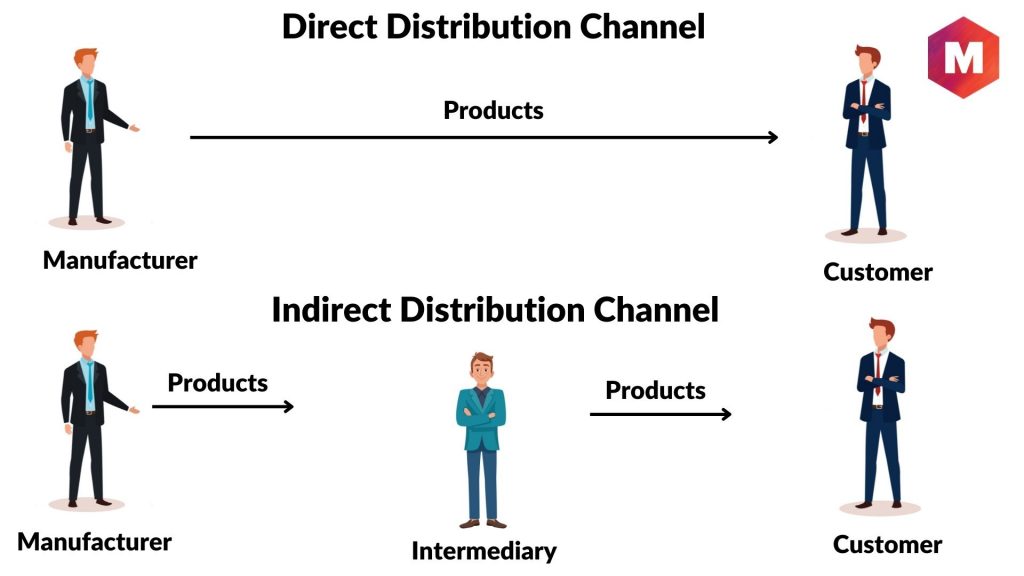Table of Contents
What is a Direct Channels?
A direct channel is a distribution channel in which there are no intermediaries involved between the manufacturer/ brand and the final customer or consumer. Direct channel are those in which manufacturers market and sell their products directly to consumers without the use of intermediaries. Direct channel can take many forms, including brick-and-mortar stores, catalogs, television infomercials, door-to-door sales, and online stores.
Direct channels can either be online or offline, with common examples of each being an e-commerce store and a physical retail store respectively. From door-to-door sales to telemarketing sales, there are many types of direct channels that can be used by a company in order to sell its products or services.
The advantages of direct channels are that they allow manufacturers to have more control over their products, they can build stronger relationships with their customers, and they can save on costs by eliminating the need for intermediaries. The disadvantages of direct channels are that they require more resources to set up and maintain, and they can be less efficient than indirect channels.
Importance of Direct Channels
Some of the reasons behind the growing importance of direct channels are
1. Increasing competition
In order to survive and thrive in today’s competitive market, it is important for companies to establish a direct connection with their target customers. This can be done by using various direct channels such as social media, e-mail marketing, etc.
2. Change in customer behavior
There has been a shift in customer behavior in recent years, with more and more people preferring to buy products and services online. This change in behavior has made it necessary for companies to focus on Direct channels
3. Increased need for personalization
In today’s world, customers are looking for a more personalized experience when they purchase products or services. Direct channels allow companies to interact with their customers on a one-to-one basis, which makes it easier to provide a personalized experience.
4. Improved ROI
Direct channels can lead to improved ROI as they allow companies to reach their target customers more effectively and efficiently. Additionally, direct channels also allow companies to save on costs as they eliminate the need for intermediaries.
5. Increased control
Using Direct channels gives companies more control over their products and services. This is because Direct channels allow companies to interact directly with their customers, which gives them a better understanding of their needs and wants. Additionally, Direct channels also allow companies to have more control over the pricing of their products and services.
6. Greater flexibility
Direct channels offer greater flexibility as compared to indirect channels. This is because Direct channels can be easily customized to meet the specific needs of a company. Additionally, Direct channels also offer companies the ability to change their marketing strategy quickly and easily in order to respond to changes in the market.
7. Enhanced customer relationships
Direct channels allow companies to build stronger relationships with their customers. This is because Direct channels provide companies with an opportunity to interact with their customers on a more personal level. Additionally, Direct channels also allow companies to collect feedback from their customers directly, which can be used to improve the products and services offered by the company.
8. Greater reach
Using Direct channels gives companies the ability to reach a larger number of people as compared to indirect channels. This is because Direct channels allow companies to interact with their customers directly, without the need for intermediaries. Additionally, Direct channels also allow companies to target their marketing campaigns more effectively.
9. Increased sales
Direct channels often lead to increased sales as they allow companies to reach their target customers more effectively. Additionally, Direct channels also allow companies to offer discounts and deals directly to their customers, which can lead to increased sales.
10. Improved brand awareness
Direct channels can help improve brand awareness as they allow companies to interact directly with their target customers. This interaction allows companies to create a more positive image of their brand in the minds of their customers. Additionally, Direct channels also allow companies to collect feedback from their customers directly, which can be used to improve the brand image of the company.
Types of Direct Channels
Some of the popular direct channels are
1. Direct marketing
Direct marketing involves the use of various marketing tools such as direct mail, telemarketing, e-mail marketing, etc. to reach the target customers directly. Direct marketing is a very effective way to generate leads and sales.
2. Direct selling
Direct selling involves the selling of products or services directly to the customers without the use of intermediaries. Direct selling is an effective way to reach the target customers and generate sales.
3. Direct response marketing
Direct response marketing is a type of marketing where the customers are contacted directly and are asked to take some action, such as making a purchase, signing up for a service, etc. Direct response marketing is an effective way to generate leads and sales.
4. Internet marketing
Internet marketing is the process of promoting products or services online using various tools such as search engine optimization, social media marketing, email marketing, etc. Internet marketing is an effective way to reach the target customers and generate sales.
5. Direct mail
Direct mail is a type of marketing where companies send promotional materials such as brochures, catalogs, coupons, etc. directly to the target customers through the mail. Direct mail is an effective way to reach the target customers and generate sales.
6. Telemarketing
Telemarketing is a type of marketing where companies use the telephone to contact potential or existing customers and promote their products or services. Telemarketing is an effective way to reach the target customers and generate sales.
7. E-mail marketing
E-mail marketing is a type of marketing where companies send promotional emails to potential or existing customers. E-mail marketing is an effective way to reach the target customers and generate sales.
8. Social media platforms
Social media marketing is the process of promoting products or services on social networking sites such as Facebook, Twitter, LinkedIn, etc. Social media marketing is an effective way to reach the target customers and generate sales.
9. Mobile marketing
Mobile marketing is the process of promoting products or services on mobile devices such as cell phones, laptops, tablets, etc. Mobile marketing is an effective way to reach the target customers and generate sales.
10. Direct-to-customer marketing
Direct-to-customer marketing is a type of marketing where companies sell products or services directly to the customers without the use of intermediaries. Direct-to-customer marketing is an effective way to reach the target customers and generate sales.
Benefits of a Direct Distribution Channels
Some of the benefits of using Direct channels are listed below
Direct channels help in building trust and credibility among the customers. They also help in establishing a direct relationship with the customers, creating a more positive image of the company in the minds of the customers, and generating more leads and sales.
With the help of a direct marketing channel, you can reach the target customers directly. They also help in saving time and money, reducing marketing costs, increasing the ROI (return on investment), driving more traffic to the website, and increasing brand awareness.
Disadvantages of Direct Channels Distribution
Some of the disadvantages of using Direct channels are listed below
Direct channels require more time and effort to set up and maintain. They also require more manpower to manage and they are not suitable for all types of businesses. Direct channels are not suitable for all products and services. Such channels are not suitable for all target markets, as they are not always available in all areas.
Direct channels may not be able to reach some target markets. They may also require a higher investment than other marketing channels. A direct chain used to sell directly may not be as effective as other marketing channels in some cases. Direct channels marketing may not be appropriate for all businesses.
Direct vs Indirect Distribution Channel
There are two main types of distribution channels: direct and indirect.
Direct channels are those in which manufacturers market and sell their products directly to consumers without the use of intermediaries. Direct channels can take many forms, including brick-and-mortar stores, catalogs, television infomercials, door-to-door sales, and online stores.
Indirect distribution channels are those in which manufacturers market and sell their products to intermediaries, who then sell the products to consumers. An indirect channel can take many forms, including wholesalers, retailers, distributors, and agents.
There are several advantages and disadvantages of using direct and indirect channels. Direct channels have the advantage of being more efficient and less expensive than indirect channels. They also allow manufacturers to have more control over how their products are marketed and sold. However, direct channels can be more difficult to set up and manage, and they may not be able to reach some target markets as effectively as indirect channels.
In most cases, it is best to use a combination of both direct and indirect channels to reach the widest possible audience.
Conclusion!
In the end, it is clear that direct channels is more efficient, less expensive, and allows more control to the manufacturers but they are difficult to set up.
On the other hand, indirect channels are easy to set up but they are expensive and manufacturers have less control. So, it is better to use a combination of both channels to get the best results.
Now, what are your thoughts on Direct channels? Do you think they are worth the effort? Let us know in the comments below.
Thank you for reading our marketing information.
Liked this post? Check out the complete series on Distribution


